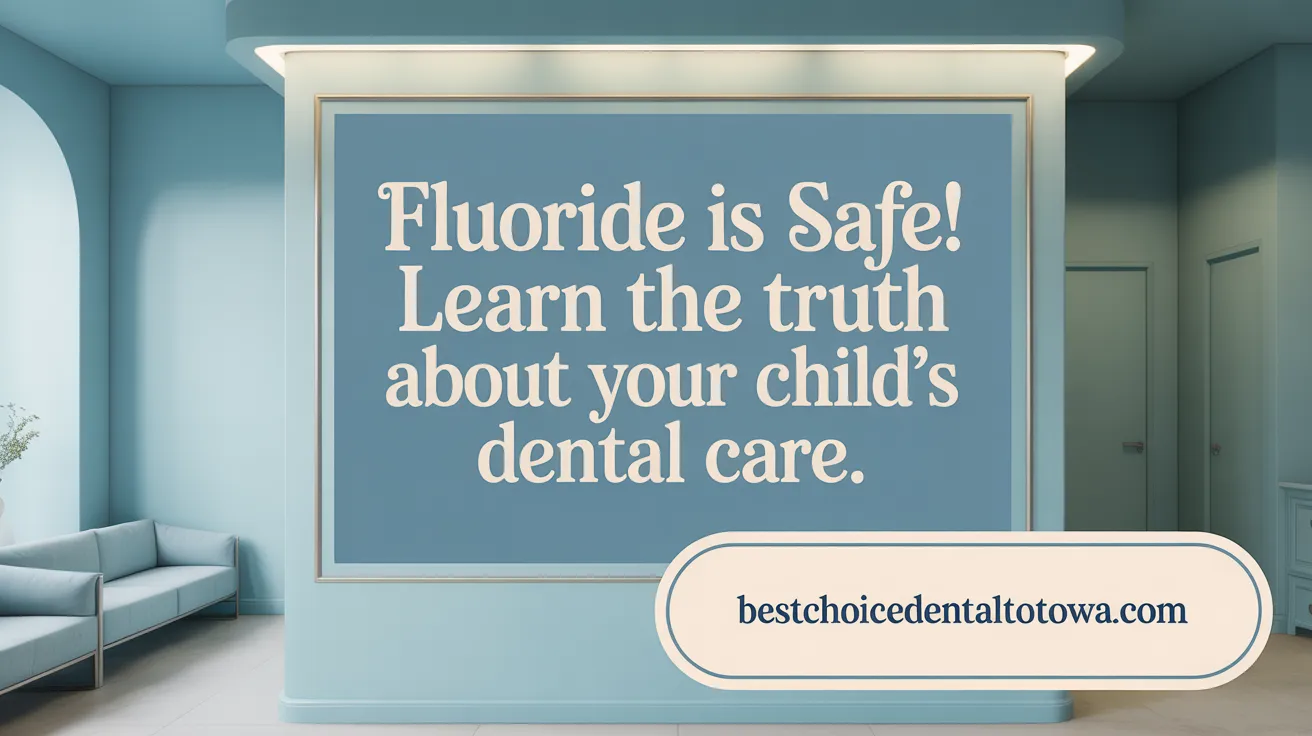Understanding Pediatric Dentistry: Beyond Common Misconceptions
Pediatric dentistry is filled with myths and facts that influence how parents and caregivers approach their children's oral health. Establishing the right dental care routines early in life can shape long-term oral wellness, but misunderstandings about children’s dental needs often cloud judgment. This article aims to clarify common myths, highlight essential facts, and emphasize the importance of preventive dental care, helping families make informed decisions for their children’s smile and overall health.
The Critical Role of Baby Teeth and Early Dental Visits

Why are baby teeth important?
Baby teeth play several essential roles in a child's oral and overall development. They are crucial for chewing food properly, which supports good nutrition and healthy growth. Baby teeth also contribute to the development of clear speech by helping guide proper tongue and lip movements. Moreover, these teeth act as placeholders for permanent teeth, maintaining the necessary space in the jaw to prevent misalignment or crowding when adult teeth emerge (Importance of Baby Teeth; Role of Baby Teeth).
When should a child first visit the dentist?
Dental experts, including the American Academy of Pediatric Dentistry (AAPD), strongly recommend that children have their first dental visit by their first birthday or within six months after their first tooth appears. Early visits are important to establish a "dental home concept", a consistent source of dental care that supports ongoing preventive efforts and timely interventions (First Dental Visit by First Birthday.
What happens if cavities in baby teeth go untreated?
Ignoring cavities in baby teeth can lead to serious problems. Untreated tooth decay can cause pain and infection, potentially affecting the child's ability to eat and speak comfortably. Additionally, infections in baby teeth can disrupt the development of permanent teeth, causing issues like misalignment or even damage to the adult teeth underneath, which can require extensive orthodontic or dental treatment later (Dangers of Untreated Cavities).
Why is early dental care essential?
Early dental visits help children become familiar with dental care routines and reduce fear or anxiety associated with dental environments (behavioral management in pediatric dentistry). They also allow for education about proper oral hygiene practices and diet to prevent cavities. Preventive treatment options like fluoride applications and sealants dental effectiveness can be introduced early to protect teeth from decay (Preventive Dental Care and Well-Child Visits).
By adhering to these guidelines and understanding the functions and importance of baby teeth, parents can ensure their children's oral health foundation is strong, preventing future dental problems and supporting healthy development (Importance of Oral Dental Hygiene for Kids).
Debunking Common Pediatric Dental Myths

Is fluoride safe for children?
Fluoride is safe and effective for children when used in appropriate doses. It not only helps prevent cavities but can also reverse early tooth decay. The American Academy of Pediatric Dentistry supports fluoride use as a critical component of children’s dental care.
Does juice consumption always protect teeth?
Juice often contains natural sugars and acids. These can weaken tooth enamel and increase the risk of cavities if consumed frequently. Water is the healthier choice, and limiting juice intake helps protect children’s teeth from decay.
Can children brush their own teeth effectively from an early age?
Young children typically lack the fine motor skills needed to brush teeth thoroughly. Effective brushing usually starts developing between ages 6 and 8. Until then, parental supervision ensures teeth are properly cleaned (Brushing and cavity prevention.
Why is flossing and regular dental visits important?
Brushing alone is insufficient to prevent cavities. Flossing removes plaque buildup between teeth where brushes can’t reach. Regular dental visits help in monitoring oral health, early cavity detection, and reinforcing healthy habits (Flossing and cavity prevention.
Are dental X-rays safe for children?
Modern dental X-rays use very low radiation levels and are considered safe for children. They play an essential role in detecting hidden cavities and monitoring the development of permanent teeth (Safety and benefits of fluoride and dental X-rays for kids).
How do sucking habits impact dental health?
Thumb-sucking and pacifier use can affect teeth alignment and jaw development if prolonged. Pacifiers are preferred over thumb-sucking since they are easier to discontinue early, ideally before age three, to prevent orthodontic problems (Pacifiers vs thumb-sucking and stopping habits by age three.
Preventive Strategies: Sealants, Fluoride, and Dietary Habits

How effective are dental sealants in preventing cavities?
Dental sealants are a highly effective preventive tool in children's dental care. They act as a protective shield over the chewing surfaces of molars, where cavities are most likely to develop. Studies have shown that sealants dental effectiveness can reduce the risk of cavities by up to 90% even after ten years when they are properly maintained. This barrier helps prevent food particles and bacteria from settling into the deep grooves of the teeth, significantly lowering decay incidence.
What role do fluoride treatments play in children's oral health?
Fluoride treatments, including varnishes applied professionally during dental visits, play a crucial role in strengthening tooth enamel. They not only prevent the formation of cavities but can also reverse early stages of tooth decay. Fluoride varnishes complement the use of fluoride toothpaste at home, providing an important layer of protection especially for young children whose enamel is still developing. These treatments are a cornerstone of preventive dentistry.
How does diet affect dental health in children?
Children’s diets have a direct impact on their dental health. Frequent snacking, especially on sugary or starchy foods, increases the likelihood of cavity formation. Bacteria in the mouth metabolize these carbohydrates into acids that attack tooth enamel. Limiting the frequency of snacks, encouraging healthy eating habits, and avoiding prolonged exposure to sugary drinks help reduce cavity risks. Offering water as the main beverage supports enamel health by helping to rinse away sugars and acids.
Early Childhood Caries Prevention
Early childhood caries is the most common chronic childhood disease but is largely preventable through timely dental visits, proper oral hygiene, fluoride use, and dietary management. Establishing a dental home concept by age one allows early intervention and education that can protect children from this common disease. Combined with sealants and fluoride treatments, these strategies form a comprehensive preventive approach to maintain healthy smiles during childhood and beyond.
Pediatric Dentists: Specialized Care for Children’s Unique Needs

What sets pediatric dentists apart from general dentists?
Pediatric dentists undergo an additional two to three years of specialized training for pediatric dentists beyond dental school. This education emphasizes child psychology, growth, and development, along with anxiety management. This training equips them to provide care tailored specifically to children’s unique physical and emotional needs.
How do pediatric dentists create a child-friendly dental environment?
Pediatric dental offices are designed with children in mind. They use specialized equipment sized for smaller mouths and create welcoming, colorful surroundings. Techniques to reduce fear and anxiety include gentle communication and distraction methods to make visits as stress-free as possible. Additional information can be found on creating a welcoming pediatric dental environment.
How do pediatric dentists manage children with special health care needs?
Trained explicitly to handle diverse pediatric cases, these dentists adapt treatments to accommodate children with special health care needs. This includes tailoring approaches to behavioral or medical challenges and coordinating with other health professionals to ensure comprehensive care. Refer to comprehensive pediatric dental care for detailed insights.
What treatment methods do pediatric dentists use for cavities and other issues?
They provide a range of treatments from preventive care—like fluoride varnishes and sealants dental effectiveness to protect enamel—to restorative options such as fillings and crowns. Early orthodontic assessments help guide proper tooth and jaw development. Emergency care for dental injuries is also a part of their expertise. Explore preventive dental treatments and fluoride applications and dental sealants effectiveness.
Why is early intervention important in pediatric dental care?
Early dental visits by about age one establish a dental home concept, allow for early detection of cavities or developmental issues, and help build positive attitudes toward dental care. Prompt treatment reduces the need for invasive procedures later and sets the foundation for lifelong oral health. You can find more about the importance of early dental visits and establishing a dental home.
Together, pediatric dentists play a crucial role in safeguarding children’s dental health through specialized training, child-focused care, and comprehensive treatment strategies. For more details, see pediatric dentistry facts.
Protecting Young Smiles: Addressing Habits, Injuries, and Anxiety
Do sucking habits like thumb-sucking affect dental development?
Prolonged thumb-sucking or pacifier use beyond early childhood can negatively impact dental development. These habits may cause misalignment of teeth and improper jaw growth if continued past ages three or four. Pacifiers are often recommended over thumb-sucking due to the easier cessation and a lesser chance of orthodontic problems. Early intervention to stop these habits helps prevent complicated orthodontic issues later (Effect of sucking habits on dental development.
How can dental injuries be prevented in children?
Dental injuries are common in childhood, especially during sports and physical activities. Mouthguards serve as effective protective equipment to shield teeth and jaws from injury. They significantly reduce the risk of fractures, displacements, and concussions during contact sports and activities like gymnastics or skateboarding. Custom-fitted mouthguards provide the best protection and are highly recommended for active children (Dental injury prevention with mouth protectors.
What causes bleeding gums in children and why is it not normal?
Bleeding gums in children often indicate gum inflammation caused by plaque accumulation. This condition is a warning sign of early gum disease rather than a normal occurrence. Proper brushing techniques, flossing, and regular professional cleanings help remove plaque and reduce inflammation. Addressing bleeding gums early prevents progression to more serious periodontal problems (Bleeding gums in children.
The importance of professional cleanings
Even with good home care, professional dental cleanings are essential. They remove tartar buildup and plaque that regular brushing and flossing might miss. Cleanings also allow dental professionals to detect early signs of decay or gum issues, ensuring timely intervention. Regular cleanings foster better oral health and reinforce positive hygiene habits in children (Professional dental cleanings.
Recognizing signs of gum disease
Parents should watch for symptoms like red, swollen, or bleeding gums, persistent bad breath, and discomfort during brushing. Early gum disease is reversible with improved oral hygiene and dental care. Prompt attention to these signs helps maintain healthy gums and avoids complications (Causes of bleeding gums.
Maintaining healthy habits, protecting teeth during activities, and managing oral health proactively create a foundation for lifelong dental wellness in children (Preventive oral health measures for children.
The Truth Behind Pediatric Dental Care: Knowledge is Prevention
Understanding the facts about pediatric dentistry is essential for fostering healthy habits and preventing dental disease in children. Early visits, proper hygiene, use of fluoride and sealants, and addressing habits and injuries are pillars of effective pediatric oral care. Pediatric dentists, with their specialized training, play a critical role in guiding families through preventive strategies and treatments tailored to children’s needs. Dispelling myths empowers parents and caregivers to advocate for the best dental health practices, ensuring young smiles grow strong and healthy for a lifetime.
